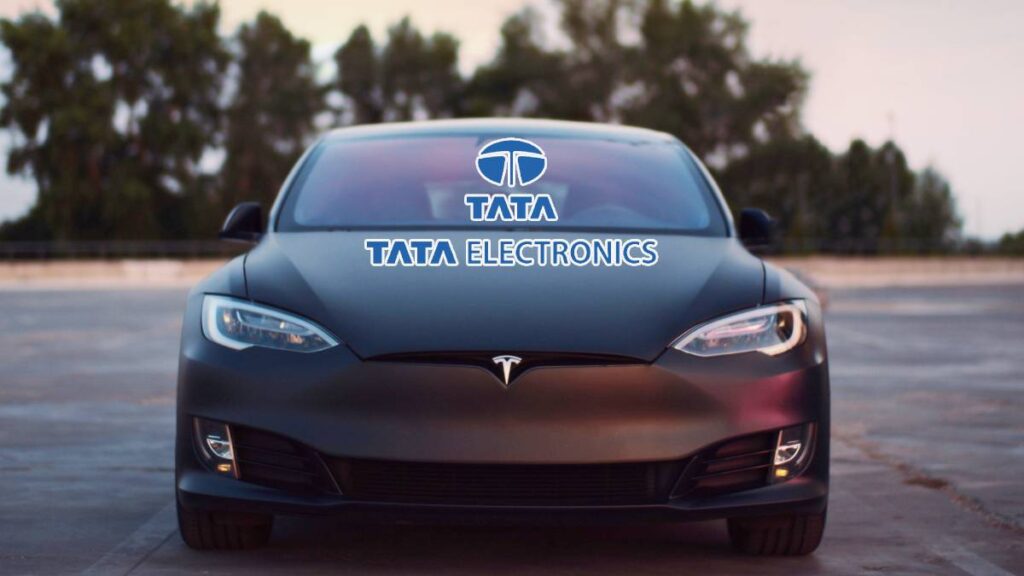As reported by ET, Elon Musk’s Tesla has exclusively partnered with Tata Electronics to acquire semiconductor chips for its global operations. The agreement between Tesla and Tata Electronics, executed discreetly a few months ago, holds significance as it positions Tata Electronics as a supplier for top-tier global clients seeking to establish a pivotal segment of their semiconductor value chain within India. This move highlights India’s growing importance in the semiconductor industry.
Tesla is gearing up for its inaugural shipment to India and is poised to scale up manufacturing. Recent reports indicate that Tesla has commenced production of right-hand drive vehicles at its factory in Germany, signaling a step closer to potential entry into the Indian market later this year.
Tesla Eyes India Entry Amidst Growing Automotive Market
Tesla, a leading electric vehicle (EV) company, is keen to enter India, known as the world’s fastest-growing automotive market. Elon Musk, Tesla’s promoter, is set to visit India this month for a meeting with Prime Minister Narendra Modi. During his visit, Musk is expected to announce potential investments in India, including commitments toward establishing EV manufacturing facilities.
Ashok Chandak, president of the India Electronics and Semiconductor Association (IESA), highlighted Tesla’s intention to create a local ecosystem of suppliers for electronics and subsystems. This move aims to reduce dependency on a single market. However, concerns persist regarding the local sourcing of semiconductors. Chandak emphasized the need for improvements in the supply chain, particularly to enhance value addition for the industrial and automotive segments. Industry experts anticipate Tesla’s investment in India will range between $2 billion and $3 billion in electric car manufacturing.
Tesla’s move to enter India comes amid challenges in its two primary markets, the US and China, where demand for electric vehicles (EVs) is slowing down. In China, Tesla faces stiff competition from domestic original equipment manufacturers (OEMs), while quality and manufacturing issues have affected its reputation and market share in the US.
India’s New EV Policy Attracts Tesla’s Interest
Following the approval of a new policy by the Indian government, electric vehicle (EV) companies can benefit from lower import duties if they establish manufacturing facilities in India. Under this scheme, companies importing EVs valued at $35,000 or more will enjoy a reduced import duty of 15% for five years if they invest at least INR 4,150 crore (approximately $500 million) in setting up manufacturing plants in India.
Considering this policy, Tesla might initially focus on introducing premium electric models in the Indian market and explore options for local manufacturing of entry-level electric cars. This development coincides with Tesla’s ongoing discussions with Reliance Industries for a potential joint venture to establish a manufacturing unit in India.
Under a new scheme, companies importing electric vehicles (EVs) valued at $35,000 or more will enjoy a reduced import duty of 15% for five years if they invest at least INR 4,150 crore (about $500 million) in setting up manufacturing plants in India. Tesla is considering this opportunity and may start by introducing premium electric models in India while exploring options for locally manufacturing entry-level electric cars. This development coincides with Tesla’s discussions with Reliance Industries for a potential joint venture to establish a manufacturing unit in India.
Electric Cars Set to Surge in India by 2030
India primarily relies on two-wheelers and three-wheelers for electric vehicles (EVs). However, by 2030, there is expected to be a significant increase in electric cars on Indian roads, largely driven by manufacturers’ competitive pricing strategies.
While India’s current market for electric four-wheelers is limited, the momentum is shifting in favor of EVs. Sales of electric vehicles surpassed 1.5 million in 2023, with two-wheelers and three-wheelers dominating the market. Despite Tata Motors leading the EV four-wheeler segment, electric cars accounted for only 2% of total car sales in 2023.
Also Read: MUFG in Talks to Acquire $1.7 Billion Stake in HDFC’s Subsidiary HDB Financial Services
Uday Kotak Warns on Global Turbulence After US March CPI Report
